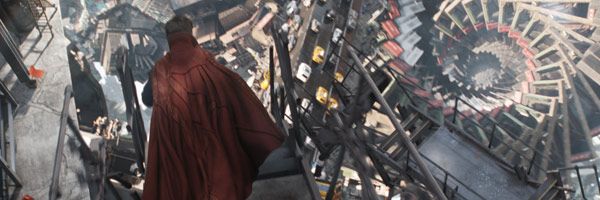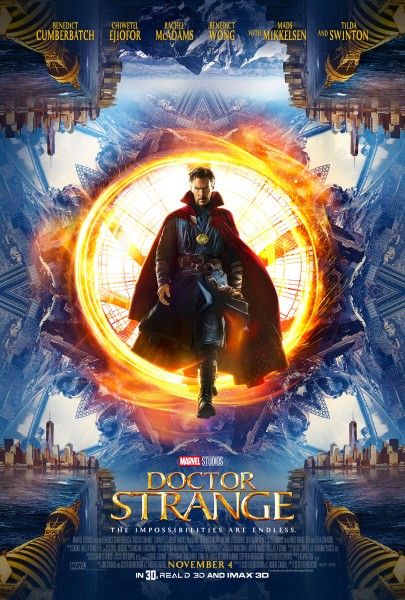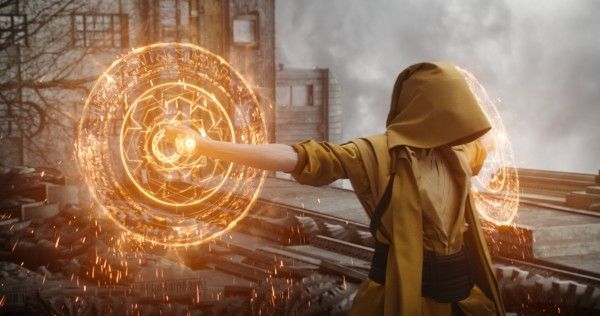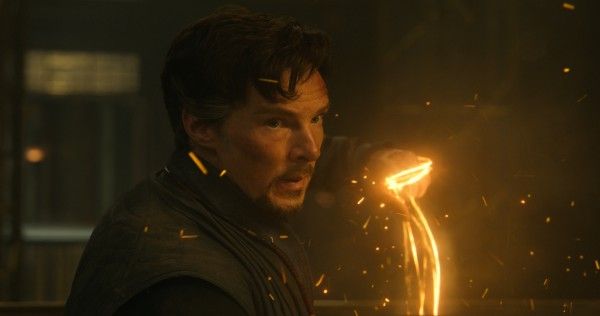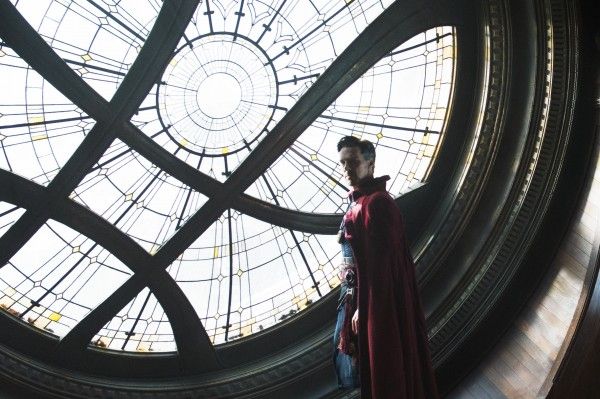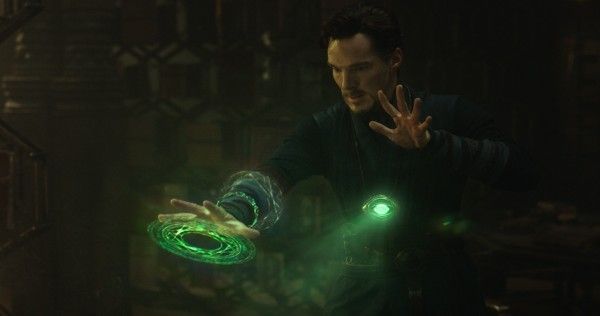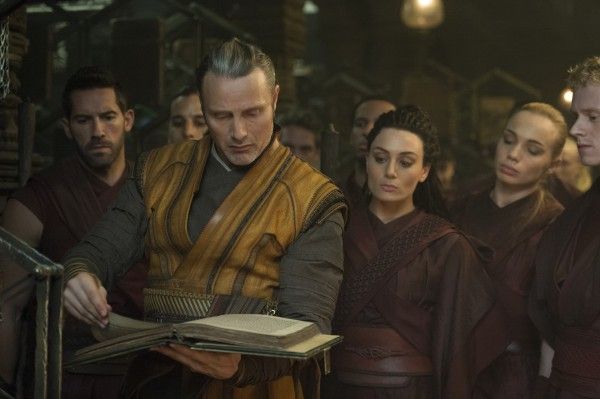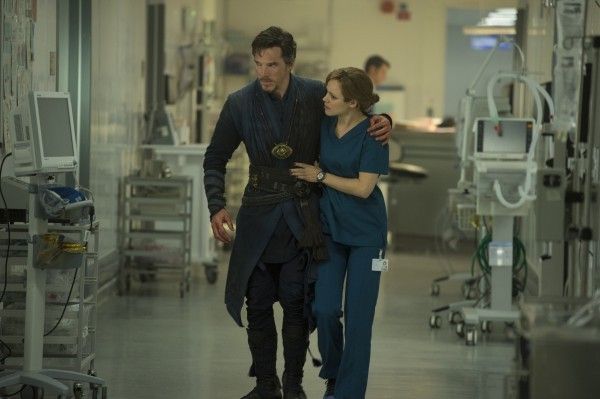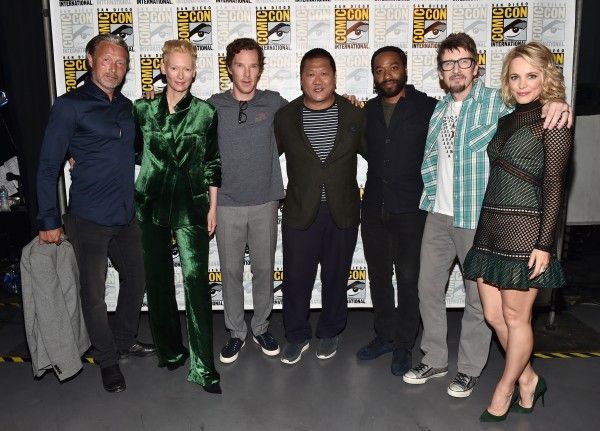The latest installment in the Marvel Cinematic Universe, Doctor Strange tells the story of world-famous neurosurgeon Dr. Stephen Strange (Benedict Cumberbatch), who is as arrogant as he is gifted in an operating room. After a horrific car accident robs him of the use of his hands, changing his life forever, he is forced to look for hope in a mysterious enclave in Nepal, where he discovers a battle against unseen dark forces bent on destroying our reality and must learn to use his newly acquired magical powers to defend the world.
During this exclusive interview with Collider, screenwriter Jon Spaihts talked about how he convinced Marvel to give him the job writing the film, collaborating with director Scott Derrickson and Marvel producers Kevin Feige and Stephen Broussard, why Doctor Strange is his favorite childhood superhero, what it means to him to be a part of the canon now, what makes this film a game-changer for the Marvel Cinematic Universe, how much the story evolved and changed, and the fact that Benedict Cumberbatch was destined to play this part. He also talked about the extent of his involvement with Pacific Rim 2, how his take on The Mummy will be “legit terrifying,” and the approach that he and co-writer Eric Heisserer are taking on Van Helsing. Be aware that there are some spoilers discussed.
Collider: You’ve said that Doctor Strange is your favorite childhood superhero. How did you initially come across him, as a kid, and what was it about him that appealed to you?
JON SPAIHTS: I was kind of a poor kid, so I didn’t get to go to comic shops, all the time. I would rummage at garage sales and friends would hand me down their comics, which meant I was always starting stories in the middle. If you read comic books over the long term, you’re always bumping into elements that have been introduced previously, but that you don’t know. Often, there’s a little note that says, “See Episode 68 of The Spectacular So-and-So.” In that way, comic books are always signaling a larger universe that you’re only seeing a little fraction of, and that’s the story we have, in real life. We move to a new city and we take a new job, and everyone seems to know each other and have a way of doing things together, and we have to put the pieces together, after the fact. Jumping into the middle of comics feels like that. It’s a big universe, and you’re just trying to put together the clues and figure out where you are.
Doctor Strange’s universe, in particular, was mind-boggling and colossal. The stakes were so big. The graphical style of it was so eye-catching with bold colors and symbols and writing that hung in the air, with inscriptions and bands of light. I loved that. I loved the look and the feeling of it. It felt very physical. It felt like solid structures of light. It felt like hard work for the body to create them and break them. I think Scott [Derrickson] has managed to capture something in this film that shows how the magic is physical, takes effort and has weight. It’s an extension of martial arts. But, I also just loved what Doctor Strange got up to. Not only did he learn to wield staggering cosmic power, but then he was constantly bumping up against adversaries far greater than he was. And as much above us as he already was, in terms of the things he was capable of doing, he was always outmatched and always forced to scramble desperately. By determination, cleverness and wit, and by the sometimes lawyer-like manipulation of the rules of magic, he would win. I loved that character. I loved that he was that powerful, and still always outgunned and just trying to hold the line and keep Earth safe.
You’ve also said that you pursued this project because you wanted to be the one to write it. How does something like that happen? How do you convince somebody that you’re the guy to take on such a big, crazy movie?
SPAIHTS: I don’t know. I did it by pestering. I was sitting in a diner, reading Variety when I saw a little note that they were looking for directors for Doctor Strange. I called my agent, in the middle of a bite, and asked him if there was a script yet. When there wasn’t, I said, “You’ve gotta call them right now and tell them I need to get in the room. Tell them I’ve gotta talk to them.” I ended up badgering my way into the room before they’d even begun talking to writers, so I was there a little earlier than they were planning. We talked all afternoon, and the fit was right. In the end, I think I’m the only writer they talked to seriously, at that point in the process. I spent the next number of months with Scott Derrickson, Kevin Feige and Stephen Broussard, figuring out what it was going to be.
When you do something like this, where you’re already a fan going into it and there are certain expectations, just because it’s a Marvel movie, how do you make it a success for you? Were there things that you felt satisfied about, just getting them into the film?
SPAIHTS: Oh, many things! Simply to be a part of the Doctor Strange canon is a delight I may never get over. It was a very open conversation. It’s not like I walked in the room and Marvel told me what I would be doing. It was a very open conversation with Scott Derrickson, the director, and Kevin Feige and Stephen Broussard at Marvel. We really started with a blank page and a blue sky, and we talked about what kind of story we might tell. It was not a given that we were going to tell the origin story. We opened ourselves to contemplating different beginnings. We thought about finding the character in mid-stride, fully formed, and picking up his backstory on the fly. But in the end, the origin story of this character, as depicted in the comics, is so operatic and beautiful, and so tragic and epic in its sweep, that it was unavoidable. We had to tell that story, and tell our best version of it. Getting to do that is a treasure I’ll keep for a long time. And there are little things, like a bandaged hand running down a row of prayer bells in a Nepalese temple. There were little things that I daydreamed up and got to see on a screen, and those things meant he world to me.
Is it hard to then possibly hand it off to another writer, or do you hope that maybe you can step in again, at some point?
SPAIHTS: Good questions. Yes, it’s hard to hand things off, creatively. If you’re a screenwriter, that’s simply the essence of the game. That’s how it works in the modern day, so you need to find your way to make peace with it. In art, as in love, keeping yourself open to the possibility of heartbreak is part of doing it right. If you’re not available for heartbreak, you might not be loving fully, and that’s as true in writing as it is in romance. I will always be wistful, if other Doctor Strange movies get written and I don’t get to write them, but I’ll also always be an avid in the theater, munching popcorn. It takes a long time to write a movie. Schedules are hard to coordinate in Hollywood. The fact is that, inevitably, a bunch of jobs you wish you’d done will get done without you, and you’ll watch them happen. You’ll do some small fraction of the things that you dreamed of doing. That’s filmmaking, in general. It’s even worse for directors, who take two years to make a picture. There are a lot of things they’ll wish they could have done. The trick is not to count the might have beens, but treasure the things you did.
Doctor Strange is so mind-blowing that it’s really a game changer. How do you feel that what’s accomplished in this film really changes things?
SPAIHTS: The character and his position in the world, as a defender of Earth from occult dangers, puts him and this whole world in the unique position to show us reality changing, with alternative realities and deforming realities, and the world turned upside down, as if in a dream. What’s really exciting about that is, while you do see that happen from time to time in films, usually each film makes one departure. What Doctor Strange does, again and again and again, is turn the world inside out, in a different way. That’s the thing that I love. It’s the infinite possibility of this sorcerer, in this multi-verse. It means there’s no end to the ways in which you can transform reality for the viewer, and that’s a thrilling possibility.
How much did this change and evolve, over time? Did you always know where you’d end up, or did the end change and shift?
SPAIHTS: We knew what the denouement needed to be. That doesn’t solve the climax for you. You’ve still got to figure out your final battle. Interestingly, in this case, the climactic battle is still very much the same on screen as it was in the first draft. The place where the change happened, and where the real problem-solving was, over the course of the film’s evolution and script’s evolution, was in the late second act. It was in the convolutions of the ongoing struggle. So, a lot of my first draft is still right there on screen, and a lot of things evolved. All of the big set pieces existed in my first draft, in some form, and a lot of that is because Scott Derrickson, the director, the producers at Marvel and I worked so collaboratively on it, in the beginning. We broke story and outlined for months and months and months, so by the time we went to script, the general form of the story was known and it was really about finding economies, figuring out what was too much repetition and what was not enough, and what was too much story and what was not enough. A lot of streamlining happened, over the course of it. I was able to come back, late in the process, and do some more writing and help bring the movie home, at the very end, which was very fun. It was great to be back aboard, and it was great to see that so much of what I’d done was still there. It was also great to see ways in which things had been streamlined and improved, and how new innovations had cropped up, in my absence. Scott Derrickson and Robert Cargill are very fine writers, themselves, and I’m delighted with their work on the movie.
Did you know what Doctor Strange you would be writing for? Was Benedict Cumberbatch already in place?
SPAIHTS: Benedict Cumberbatch seems weirdly predestined to play this part. He really could not be more perfect for it. So, when the part came into discussion, he was unsurprisingly the first name on everyone’s lips. Only conflict of schedule led to anyone else being discussed, at all. He was doing Hamlet in London for five months and the schedule didn’t work. But ultimately, we couldn’t let go of him, and Marvel made the unprecedented move of pushing the movie back five months, just to accommodate his theater schedule and to give us the gift of Cumberbatch as Doctor Strange. His is the voice I heard when I was writing the dialogue. His is the face I saw. He’s just the right guy.
Because Doctor Strange is so incredible, visually, was there anything that most impressed or surprised you about how it actually turned out?
SPAIHTS: That’s a good question. The effect that Scott calls Mandelbroting, as in Mandelbrot Fractal, whereby the world moves in a particulate manner, as if you were taking it apart, down to its geometric components. The fluidity and simultaneous angularity of that movement and the complexity of it is like a kaleidoscope. That was a surprise, and that was amazing. And the final mystical space we see, where the climactic battle happens, is a very specific homage to pieces of comic art that stand tall in the history of Doctor Strange. Seeing those realized so faithfully and so deeply was mind-blowing to me, and a surprise. It’s just incredible to be close to the process when a VFX heavy movie is getting born because of the rate at which it grows and deepens. It’s extraordinary.
How much work did you do on Pacific Rim 2? Did you craft a new story for that?
SPAIHTS: I did some work on Pacific Rim 2, but it was very concentrated work for a short time. I think it helped move the film into production, but when the present director came aboard, I think he came aboard with a lot of story ideas of his own. I think it’s very much his vision, going forward, and I don’t know how much of my story remains.
You worked on The Mummy and you’re working on Van Helsing, which are both worlds and characters that people are familiar with, and you’re getting to put your own spin on them.
SPAIHTS: Absolutely, and it’s really thrilling! It always varies. Sometimes things stay very true to your vision and sometimes they evolve passed you when you move on. I did a lot of time on The Mummy, with a bunch of draft on my own and a bunch of drafts co-written with the director of the film, Alex Kurtzman. And Van Helsing I co-wrote with a friend of mine, Eric Heisserer, who’s got another great sci-fi film coming out this year. That’s the first time I’ve written something from the ground up with a partner, and that was a lot of fun.
How different is your take on Van Helsing?
SPAIHTS: It’s a new creation, so it doesn’t owe much of a debt to prior films, but it is still a very romantic departure from the character as incepted in Bram Stoker’s novel, Dracula, where it was a Dutch doctor who figures out a very surprising answer to an odd medical question. This is a monster hunter with encyclopedic knowledge, but it’s set in the present day and it’s just filled with good stuff I’m not allowed to talk about. But I’m very excited about this new incarnation of Van Helsing, and I hope that as the Universal Monsters Cinematic Universe begins to take flight, we’ll see him cropping up in other stories, as well.
When I spoke with Russell Crowe for The Nice Guys, he talked about The Mummy a bit and how the movie will seriously scare the shit out of people. Is that a fair assessment?
SPAIHTS: Yes, it’s not a campy series. Even to go back to the original Universal Monster movies with Lon Chaney and Boris Karloff, they are not really terrifying even then. Maybe sensibilities were different and people were easier to scare at the time, but they’re slow and they’re parlor stories, for the most part. They’re not terrifying, in modern terms. We’ve gotten really good at scaring people in movies. So, the nice thing about this Mummy is that it has the swash-buckling action-adventure character of a modern epic action movie, but it’s legit terrifying. It will scare you.
Doctor Strange is now playing in theaters.

